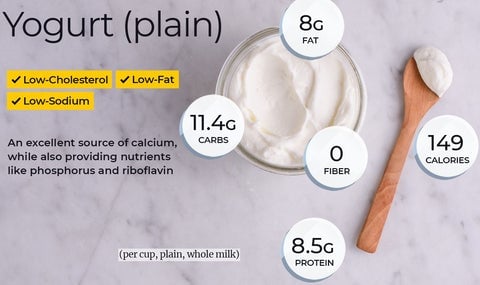Yogurt Nutrition
A perfect breakfast, after lunch or dinner dessert, or a quick snack. Yogurt is not only one of the most versatile foods, but also one which has digestive benefits, can lower blood pressure and reduce your risk of osteoporosis
Made by fermenting milk, yogurt is rich in either whey (water-soluble) or casein (insoluble) protein – both are full of essential amino acids, which your body needs to grow and function to its fullest potential. Approximately 80% of yogurt proteins are caseins, which increase the absorption of minerals including calcium and phosphorus, and help keep blood pressure levels low. Meanwhile, the other 20% is whey, which is popular with sportspeople as it’s high in branched-chain amino acids like valine, leucine, and isoleucine.

The kind of milk used to make yogurt determines the fat content – most sold in America is either low-fat or fat-free, meaning it can be between 0.4% in non-fat yogurt compared to 3.3% or more in yogurt made from full-fat milk. Around 70% of yogurt is saturated, though it also contains monounsaturated fat and around 400 different types of fatty acids.
Before loading up your spoon it’s important to remember that yogurt is also packed with simple sugars called lactose (milk sugar) and galactose, and these carbs can sneak up into high proportions. Most yogurts also have added sweeteners, so keep an eye out for the sucrose (white sugar) levels if you’re trying to be super healthy.

Yogurt has a smaller lactose content than milk because of the fermentation process, which breaks it down to form galactose and glucose – it’s the former which turns into lactic acid and gives yogurt it’s sour flavor.
Tucked into every full-fat yogurt pot is virtually every nutrient your body requires, but it’s down to the types of bacteria used in the fermenting process that account for the nutritional value of the one you peel back the lid of. Whole milk yogurt generally contains vitamin B12, which keeps blood cells and nerves working well enough to create DNA, the genetic material in all cells.

Yogurt also gives the body calcium, which it needs to build and maintain strong bones, and boosts the working of your heart, muscles, and nerves. Phosphorus – an essential mineral that does great jobs like building strong teeth, improving energy levels, reducing muscle pain after exercise, and clearing waste from kidneys – is found in yogurt too, as well as riboflavin (vitamin B2) which converts carbs into energy. IBS sufferers can see a benefit from eating probiotic yogurt with bifidobacteria as it helps reduce constipation.
As the body ages, the chances of developing osteoporosis (weak and brittle bones) increases. Consumption of dairy products is widely credited with helping fend this off and improving bone density thanks to high calcium and protein levels, making yogurt a perfect go-to, particularly for women going through menopause or perimenopause. And those with a milk allergy or lactose intolerance should look to fortified alt milk yogurts such as almond or oat with added vitamins to get their fix from this well-rounded wonder food.
Whatever your yogurt needs or preferences, we’ve got you covered – why not stick some in your cart today?

